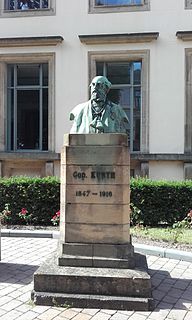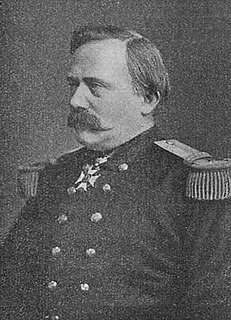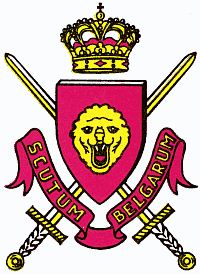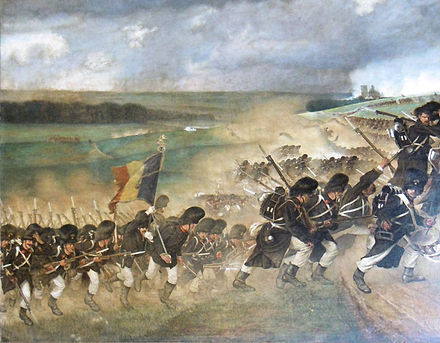
The Belgian Defense Forces is the national military of Belgium. The King of the Belgians is the commander-in-chief of the Armed Forces. The Belgian Armed Forces was established after Belgium became independent in October 1830. Since that time Belgian armed forces have fought in World War I, World War II, the Cold War, Kosovo, Somalia and Afghanistan. The Paracommando Brigade intervened several times in Central-Africa, for maintaining public order and evacuation of Belgian citizens. The Armed Forces comprise four branches: the Land Component, the Air Component, the Naval Component and the Medical Component.

Godefroid Kurth (1847–1916) was a celebrated Belgian historian and pioneering Christian democrat. He is known for his histories of the city of Liège in the Middle Ages and of Belgium, his Catholic account of the formation of modern Europe in Les Origines de la civilisation moderne, and his defence of the medieval guild system.

Henri-Alexis Brialmont, nicknamed The Belgian Vauban after the French military architect, was a Belgian army officer, politician and writer of the 19th century, best known as a military architect and designer of fortifications. Brialmont qualified as an officer in the Belgian army engineers in 1843 and quickly rose up the ranks. He served as a staff officer, and later was given command of the district of the key port of Antwerp. He finished his careers as Inspector-General of the Army. Brialmont was also an active pamphleteer and political campaigner and lobbied through his career for reform and expansion of the Belgian military and was also involved in the foundation of the Congo Free State.
Operation Vigilant Guardian was a Belgian army operation following the January 2015 Île-de-France attacks and the dismantling of a terrorist cell in Verviers having foiled attacks imminent, to deal with the terrorist threat and protect the "points" sensitive territory. The operation was put in place 16 January 2015 and is still ongoing.

This is the order of battle for the Belgian Army on the outbreak of war in August 1914, at the start of the German invasion of Belgium.

Louis de Potter, was a Belgian journalist, revolutionary, politician and writer. Out of the more than 100 books and pamphlets, one of the most notable works was his famous Letter to my Fellow Citizens in which he promoted democracy, universal electoral rights and the unity among Belgian liberals and Catholics. As one of the heroes of the Belgian Revolution, he proclaimed the independence of Belgium from the Netherlands, and inaugurated the first Belgian parliamentary assembly, on behalf of the outgoing Belgian provisional government.

Several military units have been known as the Belgian Legion. The term "Belgian Legion" can refer to Belgian volunteers who served in the French Revolutionary Wars, Napoleonic Wars, Revolutions of 1848 and, more commonly, the Mexico Expedition of 1867.

The Military Decoration is a military award of the Kingdom of Belgium. It was established on December 23, 1873 and is awarded to non-commissioned officers and other ranks of the Belgian Armed Forces for loyal and uninterrupted service. Early in the 20th century, 2 classes for the medal were created.

Though not actually a belligerent in the Franco–Prussian War (1870–71), Belgian society and politics were heavily affected by the conflict, and in particular the fear of invasion by either side. The mobilization of the army in 1870 highlighted the inadequacies of the Belgian military and led to calls for reform of the system of conscription as well as to a programme of re-fortification towards the end of the 19th century which would greatly influence the early phases of the First World War.

The Belgian Forces in Germany was the name of Belgium's army of occupation in West Germany after World War II. Lasting between 1946 and 2002, the army corps-strength FBA-BSD formed part of the NATO force guarding Western Europe against Warsaw Pact during the Cold War. At its height, 40,000 soldiers were serving with the unit with several thousand civilians also living in the Belgian zone around Cologne.

The history of Belgium from 1789 to 1914, the period dubbed the "long 19th century" by the historian Eric Hobsbawm, includes the end of Austrian rule and periods of French and Dutch occupation of the region, leading to the creation of the first independent Belgian state in 1830.
Cyclistes Frontière refers to volunteer bicycle units of the Belgian Army used to guard its borders, first established in 1934. They were intended to comprise conscripts stiffened by a cadre of career NCO and officers.
Charles Terlinden (1878—1972) was a Belgian historian, professor at the Catholic University of Louvain, and papal chamberlain.
Events in the year 1844 in Belgium.
Events in the year 1861 in Belgium.
Events in the year 1845 in Belgium.
Events in the year 1860 in Belgium.

Frédéric Auguste Ferdinand Thomas de Reiffenberg was a baron, Belgian writer, historian-medievalist, linguist. Member of the Royal Academy of Science, Letters and Fine Arts of Belgium, member of the Academic Senate and professor at the State University of Leuven.

Guillaume Delcourt was a Belgian Royal Navy officer, navigator, naval engineer, and maritime advisor to King Leopold II. He was one of the major players of early Belgian expansion around the world.

Baron Henri Louis Gustave Guillaume (1812–1877), generally going by Gustave Guillaume, was a French-born Belgian army officer and military historian who served as Minister of War from 1870 to 1873.













